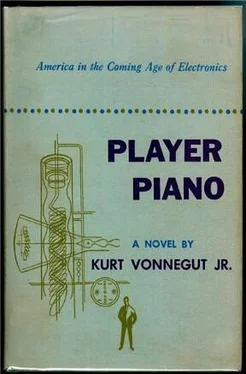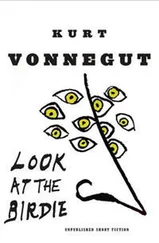Around the bar were old men, pensioners, too old for the Army or the Reeks and Wrecks. Each had before him a headless beer in a glass whose rim was opaqued by hours of slow, thoughtful sipping. These oldsters probably arrived early and left late, and any other business had to be done over their heads. On the screen of the television set behind the bar, a large earth mother of a woman, her voice shut off by the volume knob, beamed, moved her lips excitedly, and broke eggs into a mixing bowl. The old men watched, occasionally clicking their dentures or licking their lips.
"Excuse me," said Paul self-consciously.
No one made a move to let him get to the bar. A fat, whitening collie, curled beneath the barstool of an old man blocking Paul's way, showed its toothless gums and growled fuzzily.
Futilely, Paul waved his hand for the bartender's attention. As he shifted from one foot to the other, he recalled the fully mechanized saloon he, Finnerty, and Shepherd had designed when they'd been playful young engineers. To their surprise, the owner of a restaurant chain had been interested enough to give the idea a try. They'd set up the experimental unit about five doors down from where Paul now stood, with coin machines and endless belts to do the serving, with germicidal lamps cleaning the air, with uniform, healthful light, with continuous soft music from a tape recorder, with seats scientifically designed by an anthropologist to give the average man the absolute maximum in comfort.
The first day had been a sensation, with a waiting line extending blocks. Within a week of the opening, curiosity had been satisfied, and it was a boom day when five customers stopped in. Then this place had opened up almost next door, with a dust-and-germ trap of a Victorian bar, bad light, poor ventilation, and an unsanitary, inefficient, and probably dishonest bartender. It was an immediate and unflagging success.
He caught the bartender's eye at last. When the bartender saw Paul, he dropped his role of high-handed supervisor of morals and settler of arguments and became an obsequious host, like the bartender at the Country Club. Paul was afraid for a moment that he'd been recognized. But when the bartender failed to call him by name, he supposed that only his class had been recognized.
There were a few men in Homestead - like this bartender, the police and firemen, professional athletes, cab drivers, specially skilled artisans - who hadn't been displaced by machines. They lived among those who had been displaced, but they were aloof and often rude and overbearing with the mass. They felt a camaraderie with the engineers and managers across the river, a feeling that wasn't, incidentally, reciprocated. The general feeling across the river was that these persons weren't too bright to be replaced by machines; they were simply in activities where machines weren't economical. In short, their feelings of superiority were unjustified.
Now, the bartender had sensed that Paul was a personage, and he made a show of letting everyone else go to hell while he gave service to Paul. The others noticed, and turned to stare at the privileged newcomer.
Paul ordered the bottle of Irish in a quiet voice, and tried to become inconspicuous by bending over and petting the aged collie. The dog barked, and its owner turned on his barstool to confront Paul. The old man was as toothless as the dog. Paul's first impression was of red gums and huge hands - as though everything were sapped of color and strength but these.
"He wouldn't hurt nobody," said the old man apologetically. "Just kind of edgy about being old and blind, and never sure of what's going on, is all." He ran his big hands along the dog's fat sides. "He's a good old dog." He looked thoughtfully at Paul. "Say, I bet I know you."
Paul looked anxiously after the bartender, who had disappeared into the cellar after the whisky. "Really? I've been in here once or twice before."
"No, not here," said the old man loudly. "The plant, the plant. You're young Doctor Proteus."
A lot of people heard, and those closest to the two studied Paul with disturbing candor, and fell silent in order to hear whatever was being said.
The old man was apparently quite deaf, for his voice was erratically loud, then soft. "Don't recognize my face, Doctor?" He wasn't mocking, he was frankly admiring, and proud that he could prove himself on speaking terms with this distinguished man.
Paul colored. "I can't say I remember. The old welding shop, was it?"
The old man swept his hand over his face deprecatingly. "Aaaah, not enough left of the old face for my best friend to recognize," he said good-humoredly. He thrust out his hands, palms up. "But look at those, Doctor. Good as ever, and there's not two like them anywhere. You said so yourself."
"Hertz," said Paul. "You're Rudy Hertz."
Rudy laughed, and looked about the room triumphantly, as though to say, "See, by God, Rudy Hertz does know Doctor Proteus, and Proteus knows Hertz! How many of you can say that?"
"And this is the dog you were telling me about - ten, fifteen years ago?"
"Son of the dog, Doctor." He laughed. "I wasn't no pup then, though, was I?"
"You were a damn fine machinist, Rudy."
"I say so myself. Knowing that, knowing smart men like you say that about Rudy, that means a lot. It's about all I got, you know, Doctor? That and the dog." Rudy shook the arm of the man next to him, a short, heavy, seemingly soft man, middle-aged, with a homely, round face. His eyes were magnified and fogged by extremely thick glasses. "Hear what Doctor Proteus here said about me?" Rudy gestured at Paul. "Smartest man in Ilium says that about Rudy. Maybe he's the smartest man in the country."
Paul wished to God the bartender would hurry up. The man Rudy had shaken was now studying Paul sullenly. Paul glanced quickly about the room and saw hostility all around him.
Addled Rudy Hertz thought he was doing a handsome thing by Paul, showing him off to the crowd. Rudy was senile, remembering only his prime, incapable of remembering or understanding what had followed his retirement. . . .
But these others, these men in their thirties, forties, and fifties - they knew. The youngsters in the booth, the two soldiers and three girls, they were like Katharine Finch. They couldn't remember when things had been different, could hardly make sense of what had been, though they didn't necessarily like what was. But these others who stared now, they remembered. They had been the rioters, the smashers of machines. There was no threat of violence in their looks now, but there was resentment, a wish to let him know that he had intruded where he was not liked.
And still the bartender did not return. Paul limited his field of vision to Rudy, ignoring the rest. The man with thick glasses, whom Rudy had invited to admire Paul, continued to stare.
Paul talked inanely now about the dog, about Rudy's remarkable state of preservation. He was helplessly aware that he was hamming it up, proving to anyone who might still have doubts that he was indeed an insincere ass.
"Let's drink to old times!" said Rudy, raising his glass. He didn't seem to notice that silence greeted his proposal, and that he drank alone. He made clucking noises with his tongue, and winked in fond reminiscence, and drained his glass with a flourish. He banged it on the bar.
Paul, smiling glassily, decided to say nothing more, since anything more would be the wrong thing. He folded his arms and leaned against the keyboard of the player piano. In the silence of the saloon, a faint discord came from the piano, hummed to nothingness.
"Let's drink to our sons," said the man with thick glasses suddenly. His voice was surprisingly high for so resonant-looking a man. Several glasses were raised this time. When the toast was done, the man turned to Paul with the friendliest of smiles and said, "My boy's just turned eighteen, Doctor."
Читать дальше








![Курт Воннегут - Вампитеры, фома и гранфаллоны [litres]](/books/397997/kurt-vonnegut-vampitery-foma-i-granfallony-litre-thumb.webp)